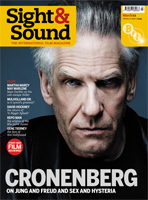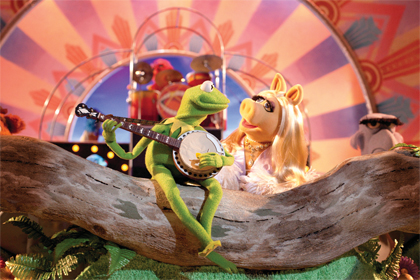Primary navigation


As the Muppets Studio is under threat from an evil oil billionaire, Kermit rallies his troupers to produce a timely protest against corporate culture, discovers Sophie Mayer
Plutocrats are villainous staples of American cinema from D.W. Griffith through the western to Mamet, but The Muppets’ baddie Tex Richman, a remorseless oil billionaire who wants to drill under Muppets Studio, prompted the ire of Fox Business Network anchor Eric Bolling, who branded the film “communist”. The Muppets’ liberal agenda is no secret: ‘The Rainbow Connection’, the Oscar-nominated finale of The Muppet Movie (1979), is a hymn to “the lovers, the dreamers”. The song is reprised here to close the telethon show that the Muppets, reunited after years apart, stage to raise the money to buy off Richman. Alas, despite the knowing deployment of screwball let’s-put-on-a-show tropes, their attempt is in vain. But Kermit rallies his troupers with a moving speech proclaiming that the essence of Muppethood is not “the building or the name, it’s each other”.
It’s this combination of idealism and pop-cultural smarts that makes the Muppets unique. Jack Black, reluctant host of their telethon, might complain about a barbershop quartet of puppets ruining ‘Smells Like Teen Spirit’, but the film cannily knows that its audience will recognise the cameo by former Nirvana member Dave Grohl, and will both feel the angst-ridden protest of the source song and enjoy the artful silliness of the parody. We learned that ability as children from television’s The Muppet Show, the second pilot episode of which, in 1975, was cannily titled ‘The Muppets: Sex and Violence’, although (and because) neither of those overused selling-points appeared in the show.
Returning to the screen in 2012, the Muppets remain free of sex and violence, although casting recently-out actor Jim Parsons as the human double of new Muppet Walter, the fan whose ardour reunites the gang, offers an implicitly queer reading of the Muppets’ alternate showbiz family. Perhaps more importantly, and unlike other nostalgic reboots such as The Smurfs (2011), the film is free from CGI, 3D and any narrative reference to cell phones or the internet, though there is a 1980s robot with a modem. Similar visual gags about Tab and Molly Ringwald make the film’s intended primary audience clear: generations X and Y, who grew up with The Muppet Show and Sesame Street, and thus with the Muppets’ hippy ideals which they may want to impart to their children. Kermit’s signature song in the show, ‘It’s Not Easy Being Green’, spoke both to liberal identity politics (reflected in the film’s ethnically diverse cameos) and to the anti-Big Oil environmental movement.
While the TV show definitely offered a ‘complicitous critique’ of corporate and celebrity culture, to borrow Linda Hutcheon’s useful phrase, the new film strikes an uneasier balance as a story about failing to thwart a hostile corporate takeover of the Muppets. This is after all a movie produced by Disney, the corporation that bought the Muppets name (and who sneak in two vainglorious helicopter shots of a Cars 2 billboard atop the Muppets Studio). It’s an intriguing, and not entirely successful, disavowal of the corporate structure of Hollywood, in order to position the Muppets brand as ‘uncynical’.
Uncynical sells, of course, or Disney would never have unshelved the Muppets. Their complicit yet anti-capitalist position is, like 80s nostalgia and the importation of a bromance framework (inevitable given that screenwriter-star Jason Segel is part of the Apatow pack), a sign of the Muppets’ evergreen ability to be timely: it’s a film for 2012, for the 99 per cent, for the Occupiers who have been criticised as Starbucks-quaffing smartphone revolutionaries seeking a rainbow connection that could only be called ‘kermunism’.
Serious mischief: Tom Charity on Joe Dante (October 2010)
Handmade magic: Kihachiro Kawamoto's animated shorts reviewed by Tim Lucas (September 2008)
Team America World Police reviewed by Leslie Felperin (January 2005)
I ♥ Huckabees reviewed by Ben Walters (December 2004)
The Adventures of Elmo in Grouchland reviewed by Heather Puttock (July 2000)
Muppets from Space reviewed by Leslie Felperin (January 2000)